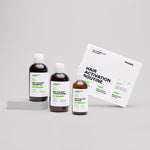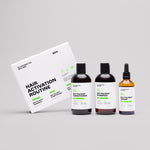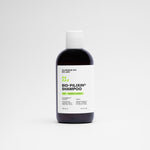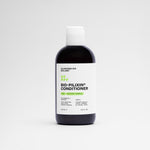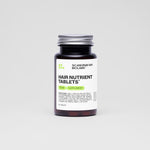Looking to improve hair thickening in 2024?
This guide highlights the best techniques and products to achieve fuller, healthier hair.
From advanced treatments to everyday tips, discover how to enhance hair thickness and boost your confidence.
Table of content
Why am I losing my hair?

The volume of your hair follicle determines the thickness of your hair. The part of hair strands inside a skin pore is called a hair follicle. If the size of your hair follicle grows, your hair strand gets thicker. A hair follicle comprises parts in charge of a hair strand's life cycle.
Stem cells in a hair follicle can grow new cells as long as you live. In a normal hair cycle, the active stem cells stop making hair for short periods.
This keeps their regeneration in check. Aside from the hair cycle, many things can cause hair to grow more steadily or even stop growing.
Genetics
Men and women can lose or have less hair because of their family history and genes. Male pattern hair loss is commonly used to refer to hair thinning in men, while female pattern hair loss is used to describe hair thinning in women.
Hair loss and thinning can be caused by genes that come from either parent. If your parents have hair loss, there is a chance that you will too.
Age
Because of declining hormone levels, many women who have gone through menopause will notice their hair getting thinner. Some men's hair will slowly start to thin as they get older. In fact, by the time they are 50, 85% of men will have "considerably" less hair.
Underactive thyroid
When the thyroid doesn't work as it should, it messes up how it makes thyroid hormones. This can lead to hair loss. Talk to your doctor if you have any other signs of an underactive thyroid, like feeling tired or not being able to lose weight.
As your leading source for hair health information over the past 4 years, we never compromise on accuracy. When it comes to your health, you deserve information you can truly rely on - and earning your trust is our top priority.
Here's how Scandinavian Biolabs ensures every piece of content meets the highest standards of accuracy and integrity:
- Credentialed Experts: Our reviewers are actively practicing doctors and medical researchers
- Stringent Reviews: Content undergoes rigorous editing by subject specialists and review by a practicing doctor.
- Evidence-Based: We rely on well-established research from trusted scientific sources like peer-reviewed journals and health authorities.
- Full Transparency: Our editorial standards, writer credentials, reviewer credentials, correction process, and funding are all publicly documented.
- Independent Voice: While we do promote products, we operate in a vacuum to business operations. Our main goal is just an unwavering commitment to providing medically-sound guidance.
You can count on Scandinavian Biolabs to consistently deliver the trustworthy health information you deserve. Read our Editorial Standards.
11 tips to thicken your hair
- Try a natural hair growth routine - Reduces hair loss and promotes thicker hair with Capilia Longa.
- Get the right haircut - Layers and mid-length cuts add volume and texture.
- Get a hair and scalp examination - Professional assessment for targeted treatment.
- Eat a balanced diet - Nutrient-rich foods like salmon and spinach support hair health.
- Stay hydrated - Prevents dry, flaky scalp and hair breakage.
- Exfoliate your scalp - Removes buildup, promoting healthier hair growth.
- Avoid heat treatments - Prevents damage and split ends by minimizing heat styling.
- Use a gentle shampoo and conditioner - Protects and nourishes hair with natural ingredients.
- Take the right supplements - Supports hair health with essential vitamins and minerals.
- Shampoo less - Prevents hair damage and brittleness from over-washing.
- Try a morning hair wash - Reduces frizz and breakage, making hair look fuller.
1. Try natural hair growth routine

The Hair Growth Routine is designed to help reduce hair loss, help you grow new hair, and keep your hair looking stronger, healthier, fuller, and thicker. This product and solution for hair thickening will show you the difference it makes naturally.
The product keeps hair follicles from getting damaged, repair damaged hair and helps new hair grow. The routine has made even the weakest hair look and feel better. It is reliable for sensitive scalps and dyed hair and can be used on all hair types.
One of the essential active elements, Capilia Longa, is made to turn back the biological clock (figuratively) and produce cells that can cause thick, strong hair. When hair follicles are healthy, they stick to the shafts better, which makes hair much denser.
All the parts work together to guarantee that your hair is stronger, grows back faster, and grows more in 150 days. If it doesn't work, we provide 100% refund!
If you use it every day, your hair will be healthier and last longer.
2. Get the right haircut
Consider the length and the layers of your hair while getting it cut. Longer layers give weight to the hair, making it lie flat and appear thinner. Layers provide texture and volume to a shorter haircut, making it appear thicker.
Also, consider straightening your bottom layer to make it fuller instead of getting a V or U cut, where your hair is shorter in the front and longer in the back. If you have thin hair, consider having a mid-length or longer haircut.
3. Get a hair and scalp examination

It might be difficult to determine why your hair is coming out and how to cure or prevent it. A dermatologist can examine your medical history and ask questions about your lifestyle to determine why your hair is falling out.
They can also perform a professional hair and scalp study to determine the problem. Your dermatologist will examine your hair and scalp thoroughly. They may take a sample or perform a scalp biopsy to discover more.
4. Eat a balanced diet
A well-balanced diet fuels your body's digestive fire and regulates cell metabolism in hair follicle stem cells. Your blood arteries supply vitamins to your hair follicles. Biotin aids cells in producing energy from the food they consume. Keratin is the main component of a hair strand.
So, eat healthy to give your hair the nutrition it requires to grow thicker and stronger. Foods that can help thicken your hair include salmon, fenugreek seeds, flax seeds, eggs, spinach, peanut butter, pumpkin seeds, peanuts, sunflower seeds, almonds, amla, sweet potatoes, and curry leaves.
5. Stay hydrated

The skin on your head can get dry, itchy, or flaky, just like any other part of your body. To prevent problems like itching, frizz, dry flakes, and breakage, drinking 4-8 glasses of water daily is recommended. Because of the general thinning that can result from this kind of breakdown, hair loss can occur if it is not addressed.
6. Exfoliate your scalp
Even if you do everything correctly, your hair may still appear flat due to a problem with your scalp. Shampoos, conditioners, and oils can accumulate on the scalp and weigh down the hair at the roots over time.
Exfoliating your scalp removes buildup from products and the environment. This creates a new, clean, lighter surface. Exfoliating is an easy approach to giving each strand of hair a natural lift.
One of the easiest method is to employ a scalp massage.
If your hair is getting thinner, adding an exfoliating scalp massage to your hair routine could make a significant difference. This increases blood flow to the scalp, promoting hair growth and unclogging hair follicles clogged with sebum and hair products. Hair loss and hair health may improve with time.
For best results, use it with a hair growth serum or minoxidil.
7. Avoid heat treatments
Stop using hot equipment and blow drying your hair if you want it to thicken. Heat can cause cuticle damage in your hair, resulting in split ends that break off and leave you with less hair.
Instead of curling your hair daily, try sleeping in loose braids to add texture to your air-dried hair. Instead of blow-drying your hair after every wash, use a leave-in sea salt spray. When it dries and creates waves, it will add texture to your hair.
8. Use a gentle shampoo and conditioner
Chemical shampoos contain harsh surfactants. Sulfates generate a lather when they touch your scalp, removing both required and unneeded materials from your hair roots. On the other hand, herbal shampoos contain natural surfactants that clean your hair while preserving essential oils that are beneficial to your scalp.
The natural hair thickening shampoo has no harsh chemicals and can be used on all hair types. Herbal shampoos also nourish your hair roots by introducing natural oils and minerals into your hair follicles.
If you must use chemical shampoo, dilute it before applying it to your hair. The harsh chemicals in them make hair less likely to frizz and break. After shampooing, apply conditioner to your hair to keep it healthy until your next wash.
Avoid conditioners that include chemicals and only operate for a brief period. Instead, use conditioner to get to the source of hair issues.
9. Take the right supplements
In addition to eating right, which we've already talked about, it's usually a great idea to take supplements. A healthy hair supplement can prevent hair from becoming brittle and damaged. It can also aid in developing a healthy scalp and shinier hair.
10. Shampoo less
When they wash their hair, many believe they take good care of it. However, washing your hair daily or regularly can damage it, make it brittle, and make it appear thinner. This is because wet hair is more flexible and prone to breaking when scrubbed. Shampooing your hair less frequently will help keep it thick and healthy and prevent hair loss.
11. Try a morning hair wash
Because hair absorbs moisture, nutrients, leave-in conditioner, and cream and grows when it dries, styling it in the morning rather than at night will make it look fuller and thicker. Tossing and turning all night is also one of the simplest ways to cause your hair to frizz and break, so wash it in the morning and start over.
Can you get thicker hair?
Yes. You can make your hair thicker by making the tiny hair follicles bigger again. Many things can cause the count of your stem cells to go down, and the shrinking of your hair follicles can be stopped with other stem cells that are still working.
Your blood vessels bring food to the hair follicles. Also, they have complicated effects on your hormones. One way to get your hair follicles to open is to make your scalp's blood flow faster. The balance of your hormones controls the way your stem cells work.
Possible causes for thin hair
Here are the possible causes of thin hair:
Thinning hair could be a result of genetics.
If your parents or grandparents had thinning hair, you are more likely to as well.
Thinning hair could also be a result of ageing.
As you get older, your hair naturally thins out.
A poor diet can also lead to thinning hair.
Eating healthy foods is key to keeping your locks looking lush and full.
Harsh hair products can also cause thinning hair.
Products that are too heavy or contain harsh chemicals can strip the natural oils from your scalp, leading to thinning hair.
Chemicals in the environment can also cause thinning hair.
Things like pollution and smoke can damage your hair, making it more prone to breakage and thinning.
Medical conditions such as alopecia, thyroid problems, and lupus can all lead to thinning hair.
If you are experiencing unexplained thinning, it is important to see a doctor to rule out any underlying medical issues.
Can thin hair become thick again?

The quick answer is yes, but not in the way you might expect. Thick hair refers to the amount of hair on your scalp. Thus, the primary goal is to grow more hair or, in most cases, maintain the amount of hair you already have.
So, to understand how to make your hair thicker, you must first understand how hair grows.
The follicle and the shaft are the two major components of hair. The follicle is located on your scalp. Some refer to it as the root. The shaft is the thread that passes over your head. When most people are born, their scalps have approximately 100,000 hair follicles.
According to the American Academy of Dermatology, the average person's hair grows roughly half an inch per month. Men's coats grow faster than women's hair.
You're also not insane. If your hair seemed thicker when you were younger, it's because your scalp expands with age. Also, as people get older, their hair follicles stop making hair, which can cause their hair to thin or make them bald.
You can be pleased with the appearance of your hair because there are methods for making thin hair thicker, fuller, and healthier hair. Making modifications to your diet, taking the proper supplements, and using the right hair care products can help you enhance the health of your hair and get the fullness you desire.
Do hair thickening products work?
Hair thickening products can give hair more volume, making it look fuller and bouncier. They often contain vitamins and nutrients that help restore hair's texture and volume.
While these products can't prevent hair loss or stimulate new growth, they can make hair appear thicker temporarily.
Effectiveness varies based on the product and individual use. Hair thickening products work to some extent but need to be used consistently for visible results.
It's essential to choose products based on your hair's needs, budget, and the cause of your thinning hair.
Always test a product to see how it works for you before committing to regular use.
Read more:


